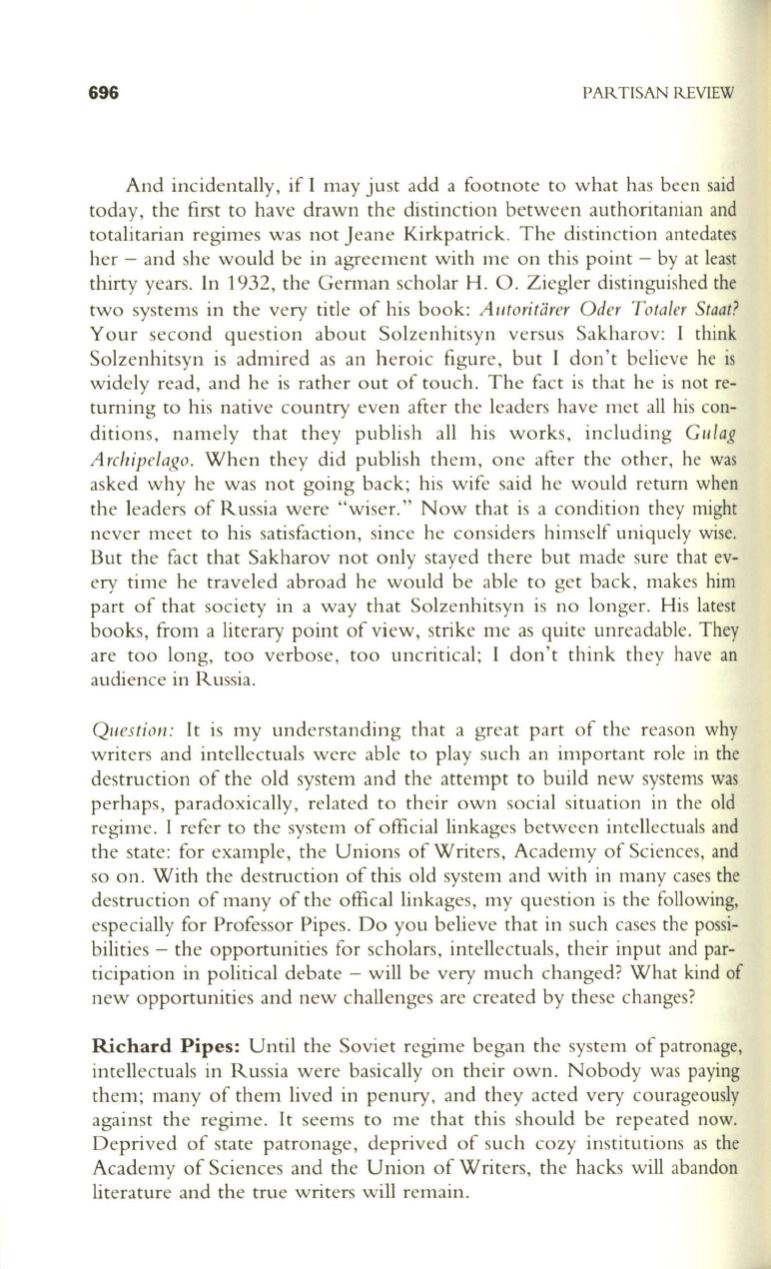
696
PARTISAN REVIEW
And incidentally, if I may just add a footnote to what has been said
today, the first to have drawn the distinction between authoritanian and
totalitarian regimes was not Jeane Kirkpatrick. The distinction antedates
her - and she would be in agreement with me on this point - by at least
thirty years. In 1932, the German scholar H. O. Ziegler distinguished the
two systems in the very title of his book:
Alltoritiirer Oder Totaler Staat?
Your second question about Solzenhitsyn versus Sakharov: I think
Solzenhitsyn is admired as an heroic figure, but I don 't believe he is
widely read, and he is rather out of touch . The fact is that he is not re–
turning to his native country even after the leaders have met all his con–
ditions, namely that th ey publish all his works, including
Glliag
Archipelago.
When they did publish them, one after the other, he was
asked why he was not going back; his wife said he wou ld return when
the leaders of Russia were "wiser." Now that is a condition they might
never meet to his satisfaction, since he considers himself uniquely wise.
But the fact that Sakharov not only stayed there but made sure that ev–
ery time he traveled abroad he would be ab le to get back, makes him
part of that society in a way that Solzenhitsyn is no longer. His latest
books, from a literary point of view, strike me as quite unreadable. They
are too long, too verbose, too uncritical; I don't think they have an
audience in Russia.
Qllestion:
It is my understanding that a great part of the reason why
writers and intellectuals were able to play such an important role in the
destruction of the old system and the attempt to build new systems was
perhaps, paradoxically, related to their own social situation in the old
regime. I refer to the system of official linkages between intellectuals and
the state: for example, the Unions of Writers, Academy of Sciences, and
so on. With the destruction of this old system and with in many cases the
destruction of many of the offical linkages, my question is the following,
especially for Professor Pipes. Do you believe that in such cases the possi–
bilities - the opportunities for scholars, intellectuals, their input and par–
ticipation in political debate - will be very much changed? What kind of
new opportunities and new challenges are created by these changes?
Richard Pipes:
Until the Soviet regime began the system of patronage,
intellectuals in Russia were basically on their own . Nobody was paying
them; many of them lived in penury, and they acted very courageously
against the regime. It seems to me that this should be repeated now.
Deprived of state patronage, deprived of such cozy institutions as the
Academy of Sciences and the Union of Writers, the hacks will abandon
literature and the true writers will remain.


